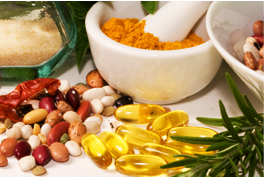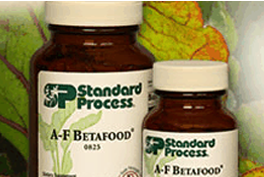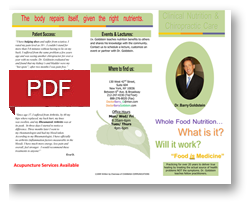Sciatica is condition that causes pain in the back, hip, and outer side of the leg. Sciatica is caused by compression of the largest nerve in the body, the sciatic nerve, which begins in the lower back and travels down the buttock and the length of the leg.
Sciatica can occur suddenly and be a painfully debilitating new experience, or it can be a recurring condition that you have lived with for many years. Dr. Barry Goldstein, a clinical nutritionist in Times Square, realizes that often, sciatica is treated with varying anti-inflammatories and over-the-counter medications. What most people who suffer from sciatica do not realize is that clinical nutrition is a powerful tool when combating sciatica.
A high percentage of sciatica sufferers are able to relieve their pain by altering their diets. Follow the below diet tips to alleviate sciatic nerve pain through clinical nutrition:
- Sometimes, sciatica can be triggered by poor diet that causes constipation. You should incorporate fiber rich foods and add a lot of fruits and vegetables in order to prevent constipation.
- Oily fish such as salmon and halibut that are rich in omega 3 fatty acids
- Fresh pineapples and berries are anti-inflammatories that aid in healing and also boost the immune system
- Drink 2-3 cups of green tea
- Add turmeric, ginger, and garlic to your meals
- B-Vitamins are very important to take in when suffering from sciatic nerve pain, and can be found in green peas, spinach, navy beans, nuts, bananas, etc.
- Foods rich in A-Vitamins such as dairy products, dark leafy vegetables, orange colored fruits, eggs, and oily fish.
- Foods rich in C-Vitamins, especially citrus and tomatoes
- K-Vitamins sources such as broccoli and spinach
- Drink plenty of water, between 1.5-3 liters a day
What to avoid:
- Clinical nutritionists in Times Square recommend cutting out animal products besides oily fish for the first two weeks.
- Avoid foods that contain sunflower oil, corn oil, sesame oil, margarine, and partially hydrogenated oil.
- Stay away from stressor foods such as caffeine, processed food, soda, refined sugars, and chocolate.
Alcohol and cigarettes also produce a stress reaction in the body, so be sure to stay away from those products as well.










